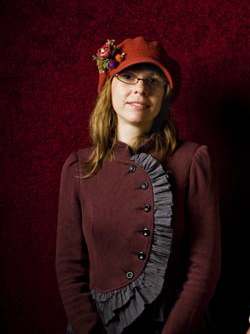Clyne’s new work proves the highlight of MusicNOW program

Monday evening’s MusicNow concert at the Harris Theater was short and mostly sweet, with four contemporary composers briefly taking their turn in a superbly played program featuring members of the Chicago Symphony Orchestra and Chorus.
MusicNow, the CSO’s contemporary outreach series, is in its second decade and seems to be enjoying a revitalization under the tutelage of Meade composers-in-residence Mason Bates and Anna Clyne. The two hyperactive young composers, Clyne from Britain and Bates from Virginia, have been renewed in their positions for another two years and the smoothly-run and listener-friendly event goes a good way toward showing why the Riccardo Muti appointees are so well-liked in this town.
With the moody electronica provided by DJs Justin Reed and Chris Widman suffusing the neon glint of the Harris lobbies in pre- and post-concert sets, the informal tone was enhanced by a general admission ticket and a sizeable turnout of mostly younger fans who drifted happily around the venue and were rewarded with free pizza and beer at the end of the concert.
But the program was rightly the main focus, and each piece provided its own pleasure, with the lovely take on an Emily Dickinson poem by Anna Clyne proving to be the highlight.
As Sudden Shut, a world premiere MusicNOW commission, was performed by three female voices from the CSO chorus and a chamber ensemble crisply conducted by new-music specialist Benjamin Schwartz. The piece was marked by a limpid simplicity which reflected the intensity of the poetry by repetition of key phrases in the way one might reread and ponder a poem of such deceptive plainness. The postmodern texture reflected madrigal-like harmonies layered onto fractured and at times muscular tonalities, which were enhanced by the projection of the poetry on a screen behind the performers. Clyne’s piece is the first section of a longer work incorporating additional Dickinson poems, and one looks forward to hearing more.
Run Chime, the short (4 minutes) opening work by Britisher Dave Maric, referenced Bartok and Hermeto Pascoal according to his prerecorded comments, but slipped by so swiftly with a string quartet pitted against an array of percussion instruments that one barely had time to register the piece’s good-humored textures before its driving conclusion.
The prolific veteran Steven Stucky (a Pulitzer winner) was represented by his 2009 Piano Quintet, conducted by Schwartz and offering more traditionally modernist tonalities in a short single-movement work featuring complex interplay between the piano and strings. The atmospheric cello of Kenneth Olsen contrasted with the broad gestures of a very dramatic work.
The longest piece of the evening (25 minutes) was more of a challenge. Austrian composer Georg Friedrich Haas’ REMIX is a reimagining of several of his earlier works.
Haas (b. 1953) has been identified as a “spectral,” visually oriented composer and in his video introduction he described the individual sonic blocks of his music forming a totality in the same way flash cards in a sports arena create a visual totality. REMIX is densely layered and tectonic in in its presentation. The orchestration for a full outlay of brass and winds and some powerful percussion was exciting and brought the concert to a rousing, eventful close.
Posted in Performances




